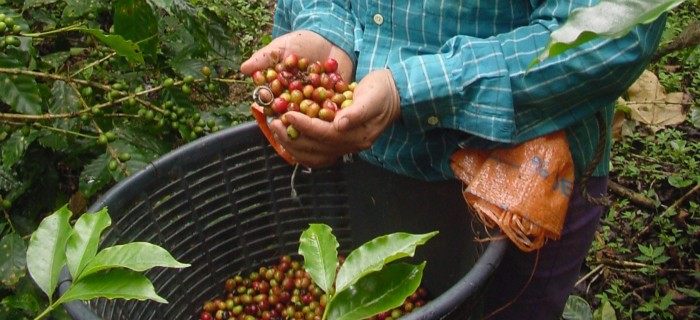End of Organic Coffee? Small Farmers in the USDA’s Sights
The USDA has done it again.
Remember when the U.S. Department of Agriculture tried to relax organic standards for the agri-foods industry by accepting irradiated food, genetically engineered organisms, and sewage sludge as “organic”?
It took a sustained outcry from organic producers and consumers to keep the agency from destroying the meaning of organic. Get ready. It is happening again, only this time they have set their myopic sights set on small-scale coffee farmers in the Global South.
The USDA is about to make it prohibitively expensive and logistically impossible for some hundred thousand small growers to maintain their organic certification—and importantly—to reap the economic benefits of organic prices, that can be as high as $.40/lb over conventional market price. This price (especially when combined with the Fairtrade minimum price of $1.26/lb), has saved many smallholders from financial ruin during the recurrent coffee crises.
Until now, official certifiers inspected smallholder “community grower groups” (usually a cooperative), to ensure compliance with organic standards. After a review of the groups internal control system, they randomly tested 20% of farms to validate farmers’ compliance. This allowed some 300 grower groups in the Global South obtain organic certification for over 100,000 farmers. (This combination of an internal control system and an external third party audit is very similar to organic food processing audits, and USDA meat inspections.)
But last month the USDA National Organic Program denied an appeal by a coffee cooperative in Mexico that had been decertified after an inspector discovered that the cooperative’s internal control system had failed to detect the use of pesticides and fertilizer bags for crop storage by one farmer. Not only did the USDA decertify the cooperative, it decided to abandon the grower group certification process altogether by unilaterally decreeing that “the use of an internal inspection system as a proxy for mandatory on-site inspections of each production unit by the certifying agent is not permitted.” Now every single farmer, no matter how small, must submit to yearly, on-site inspections. Certification inspection visits, often to remote, hard-to-access coffee farms, can take up to 3-5 days at a cost of $150-270 a day. There is little likelihood that individual smallholders—the ones growing the bulk of the world’s organic coffee—can pay this price, or that certifiers can reach all of them.
The USDA is about to make it prohibitively expensive and logistically impossible for some hundred thousand small growers to maintain their organic certification.
Organic certification already comes at a high cost for smallholders. Not only do farmers have to invest more labor in weeding, pruning, and organic fertilization, they must first sacrifice three years of farming organically without certification in order qualify. They must invest their time to organize in cooperatives under one management and marketing system and maintain a strict, documented, internal control system to make sure all members in the grower group are in compliance with organic standards and production practices.
Stay in the loop with Food First!
Get our independent analysis, research, and other publications you care about to your inbox for free!
Sign up today!It is hard to imagine who benefits from this new decision, aside from a handful of large-scale organic coffee farmers who can afford yearly inspections. It certainly doesn’t benefit organic smallholders, who produce the bulk of organic coffee in the world, or consumers, who will see the price of organic coffee go through the roof. It doesn’t benefit Fairtrade roaster-distributors who depend on the organic price to shore up the Fairtrade premium paid to many organic farmers. It doesn’t even benefit the large retailers that carry organic coffee. How will Wal-Mart and Nestlé maintain their “halo” of fairness and green-ness if the inexpensive organic and Fairtrade coffee the chains sell are replaced by high-priced coffee sold by a handful of big growers?
While this move could favor them, it does not appear that large growers are behind this development. Neither is the Mexican cooperative the real reason for the USDA-NOP’s reaction. Rather—apart from bureaucratic stupidity—it may be that the USDA, having been burned by so many large-scale organic imports from China that turn out not to be organic, has decided to tighten certification procedures.
So, hard-strapped campesino coffee coops that have spent nearly two decades making the organic certification system work, are now to be the sacrificial lambs for the industrial organic industry. By sabotaging smallholder certification, the USDA risks destroying organic—and Fairtrade—coffee markets in the U.S.
Organic farming organizations, certifiers, and Fairtrade groups will likely contest this arbitrary ruling. (We’ll see if we hear anything from beneficent retailers like Starbucks and Wal-Mart) Whatever their strategy, just like last time, it will likely take a widespread consumer outcry to keep the USDA from tearing down what so many have worked so hard to build.


 Help Food First to continue growing an informed, transformative, and flourishing food movement.
Help Food First to continue growing an informed, transformative, and flourishing food movement.




